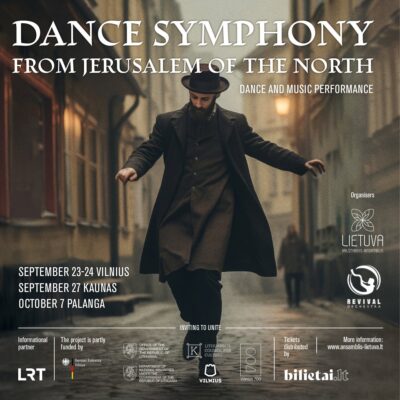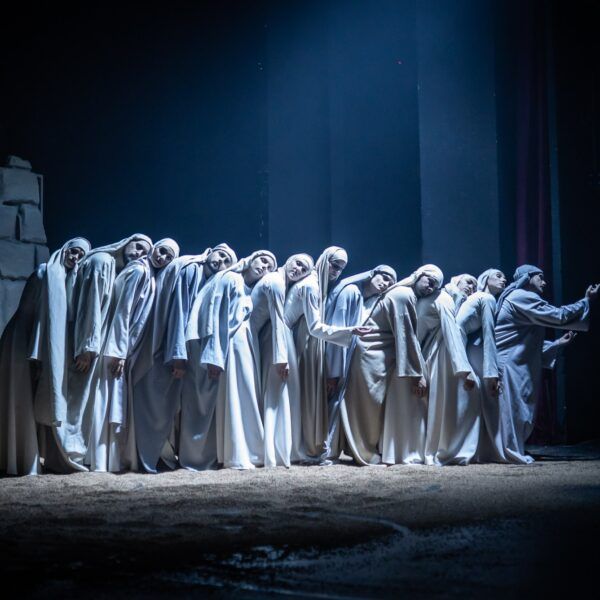
Event date: 2024-09-19
Event starts: 18:00 Event ends: 19:20
Event place: Concert hall SAULĖ, Šiauliai

Event date: 2024-09-19
Event starts: 18:00 Event ends: 19:20
Event place: Concert hall SAULĖ, Šiauliai
“We felt the connection between the Sinai desert and the sands of the Paneriai pine forest”, – said the audience when they first saw Dance Symphony from Jerusalem of the North.
After a positive reception and a touching experience of the story, the dance performance based on the music of Jievaras Jasinskis returns this autumn with even more depth. The programme of the ensemble “Lietuva” and the “Revival Orchestra” will take place on September 19 in Šiauliai and on September 24 in Alytus, inviting us to explore history in a more immersive way – through symbols, dance, live music and even the experiences that resonate deepest within us.
“A perfect blend of music, dance and visuals, with subtlety, sensitive artistic interpretations and a respectful look into the past. In this way, art brings up painful themes to appreciate our existence. Thank you for the opportunity to experience and reflect”, – thanked the audience on social media after the premiere.
“Dance Symphony from Jerusalem of the North” was specially created to commemorate the 80th anniversary of the liquidation of the Vilnius Ghetto, which is why it premiered on 23-24 September 2023. The premiere took place on September 24 2023 at the State Youth Theatre on the former site of the Vilnius Ghetto. On that occasion, the capital was also visited by distinguished guests – members of the Lithuanian Jewish community, national and foreign diplomats and others interested in the shared past of Lithuanians and Jews. It is still said that this performance is like an educational programme that the younger generation could see as a history lesson.
“What is described in music and dance passes through the fundamental events and stages of the Jewish people and takes us back to the history of Lithuania. I particularly liked the artistic decision to portray the Holocaust in an unburdening way, without exaggerated depictions of the tragedy, without the usual symbols, but at the same time revealing what a deep and terrible catastrophe it was. Yes, the Holocaust is a wound that will never heal, but the play tells the whole story. Finally, at the end, we see how it is relevant today and not forgotten, how the past is seen through the eyes of people today. Although there is a lot of darkness around us, we are already living in the light,” – expressed Rafailas Karpis, an opera soloist and the country’s most famous litvak.
The musical project is based on J. Jasinskis’s “Symphony from Jerusalem of the North”, a work that has attracted a lot of public attention. The work of the young generation composer inspired a new, larger-scale creative idea, which was realised by director and choreographer Aušra Krasauskaitė with a mesmerising movement narrative and live music by several orchestras.
“The initial idea of the performance, when talking to the set designer Gintaras Makarevičius, was to use symbols such as water, fire and earth. We stopped at sand, which has a lot of meanings. In general, I have a strong impression of Pina Bausch’s “The Rite of Spring” – what a strong and powerful message the use of the earth carries. That was another inspiration for the programme. I have lived with the theme of the play for a long time, carried it in my heart. I am happy and grateful, especially for the way the production is interpreted,” – said A. Krasauskaitė, head balletmeister of the ensemble “Lietuva”.
The story of the dance, which began 4,000 years ago, continues to this day. The programme will reveal the experiences of the protagonists of the performances, and will reflect important historical events in the form of battle scenes, which will be brought to life through dance, and will remind the audience of the common experience of Jews and Lithuania.
“In my vision as a director, the emotional background is further enhanced by dance movements, body plasticity and other engaging choreographic solutions. My trip to Jerusalem last May brought strong experiences, perceptions and shocks, and I have put all these experiences into a performance that I am extremely passionate about,” – exclaimed A. Krasauskaitė.
“Dance Symphony from Jerusalem of the North” is a joint project of the state ensemble “Lietuva” and the public institution “Revival Orchestra”, whose previous version was produced and scripted by Tadas Daujotas. The newly created performance will feature dancers from “Lietuva”, two live orchestras – the Vilnius city municipality St. Christopher’s chamber orchestra and the ensemble’s “Lietuva” orchestra which will bring an authentic sound to the musical journey. Guest musicians from jazz, classical, and folk music will also take part. Egidijus Kaveckas, the ensemble’s head conductor, is also unusually involved in the performance.
Classical music will be interwoven with exotic Middle Eastern melodies, klezmer motifs and jazz elements. This is a contemporary project with world music genre and archaic overtones, featuring the majestic sound of ancient Hebrew shofar horns, while the orchestra’s sound is subtly blended with the sounds of the kanban and reed pipe.
In the Vilnius Ghetto, spiritual resistance and a vibrant cultural life helped to survive, to unite and to keep hope alive, which is almost unbelievable in such a context. In the face of suffering and death, the ghetto’s inhabitants tried to cling to life and to express themselves: there was a theatre, professional choirs, a symphony orchestra and a jazz orchestra, exhibitions, concerts and competitions. Through theatre, culture, art and education, people saved themselves from self-destruction – even in the most difficult moments, they strengthened their sense of community, remembered the values of their people, tried to find positivity, and believed that one day they would be free. The ghetto was liquidated on 23-24 September 1943.
The state ensemble “Lietuva” continues its long-term campaign “Let’s Grow the Muscle of Unity”, which is aimed at uniting people of different nations and religions, who historically have been creating the common history of Lithuania. This campaign reminds us that the heart is the main muscle in the human body, and unity helps to unite these hearts – to unite through the living and common history of all of us.
CREATIVE TEAM:
Composer: Jievaras Jasinskis
Director and choreographer: Aušra Krasauskaitė
Set designer: Gintaras Makarevičius
Head conductor: Egidijus Kaveckas
Costume designer: Julija Skuratova
Lighting designer: Darius Malinauskas
Head of the public institution “Revival Orchestra”: Tadas Daujotas
Head of the state ensemble “Lietuva“: Edita Klaunauskaitė
Artists:
State ensemble “Lietuva“ orchestra and dancers (head conductor Egidijus Kaveckas)
Vilnius city municipality St. Christopher chamber orchestra (artistic director and head conductor Modestas Barkauskas)
Classical, jazz and folk musicians:
Mindaugas Stumbras – oud, guitars
Lina Baublytė – flute, piccolo flute
Linas Šalna – oboe
Haroldas Parulis – clarinet, bass clarinet
Lukas Grinkas – bassoon
Laurynas Lapė – trumpet
Jievaras Jasinskis – trombone, shofar
Tadas Daujotas, Viktorija Miškinytė, Mintautas Krikščiūnas – shofars
Sigitas Gailius and Andrius Rekašius – percussion
CREATIVE TEAM:
Composer: Jievaras Jasinskis
Director and choreographer: Aušra Krasauskaitė
Set designer: Gintaras Makarevičius
Head conductor: Egidijus Kaveckas
Costume designer: Julija Skuratova
Lighting designer: Darius Malinauskas
Head of the public institution “Revival Orchestra”: Tadas Daujotas
Head of the state ensemble “Lietuva“: Edita Klaunauskaitė
Artists:
State ensemble „Lietuva“ orchestra and dancers (head conductor Egidijus Kaveckas)
Vilnius city municipality St. Christopher chamber orchestra (artistic director and head conductor Modestas Barkauskas)
Classical, jazz and folk musicians:
Mindaugas Stumbras – oud, guitars
Lina Baublytė – flute, piccolo flute
Linas Šalna – oboe
Haroldas Parulis – clarinet, bass clarinet
Lukas Grinkas – bassoon
Laurynas Lapė – trumpet
Jievaras Jasinskis – trombone, shofar
Tadas Daujotas, Viktorija Miškinytė, Mintautas Krikščiūnas – shofars
Sigitas Gailius and Andrius Rekašius – percussion